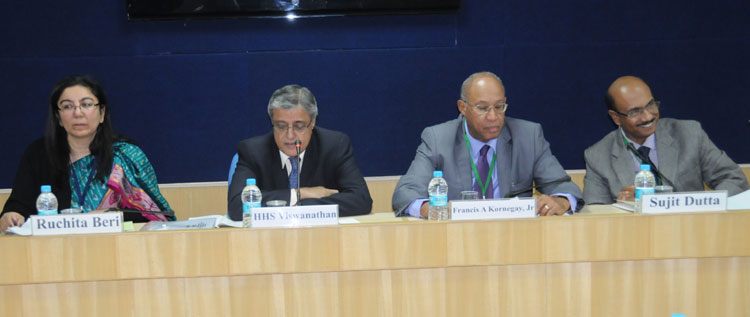You are here
Common Security Challenges for India and Africa: An Overview

The first session focused on the security challenges currently faced by India and Africa. It was highlighted that in the global security context, the security challenges have increasingly become multi dimensional, as it has come to embrace factors like tensions caused by non-state actors, challenges posed by energy insecurity, drug, arms and human trafficking, problems related to immigration, environmental problems, etc. All these challenges are common to both India and African countries. So there is a need for both to come together and devise a joint strategy to deal with challenges. The joint strategy is necessary as in next few decades, both India and Africa are to emerge as the two overly populated areas, with a large number of young population. As a result, both India and Africa are bound to face similar kinds of socio-economic security challenges such as poverty, unemployment, inequality, etc. So both will need to devise a strategy jointly to deal with challenges and ensure societal security ad stability.
The economic liberalization in the early 1990s pushed India to expand its security horizon. While during the Cold War, India was primarily concerned about tradition/military security threats posed by neighboring states like China and Pakistan, in the post-Cold War era, it became increasingly concerned about non-traditional/non-military security threats as well. Globalisation seemed to play a major role in shaping India’s notion of comprehensive security.
As both India and Africa deal with diverse ethnic, cultural, linguistic diversities, they could certainly assist each other in dealing with certain common socio-economic security challenges, such as poverty, diseases, inequality, unemployment, etc. India could definitely provide assistance to Africa in realms of capacity building, education, science and technology. India could be of assistance in making the African states adopt inclusive growth, welfare etc., and appreciate values like justice, democracy, equality, human rights, etc.
Africa is a unique continent where inter-state conflicts have been rare. The states here mostly deal with deep, long intra-state civil wars. African States do not have adequate capacities to build up strong institutional mechanisms to ensure stable and secure society. The dialogue must deal with issues like modern state building in Africa.
In the last two decades, African countries seem to look for an African solution in dealing with their security related issues. African countries should not be left alone in dealing with such challenges, as they are not restricted to Africa alone. There are a number of common security challenges faced by both India and Africa, such as, terrorism, organized crime, disease, etc. But Africa remains one of the most conflict prone zones in the world. Though the collaborative efforts of the African states have reduced the number of arms conflicts, they have not dissipated completely.
In recent times, African states have been increasingly emphasizing on dealing with peace and security issues on a priority basis. It is so because they have come to acknowledge that there is a link with security and development. Security will not be possible without development and vice versa. There is definitely a role external players like India could play in terms of supporting the regional security efforts of the African countries through multilateral institutions like the African Union, while continuing with its support for the UN peace keeping efforts in Africa.
Report prepared by Pranamita Baruah, Researcher, IDSA.
